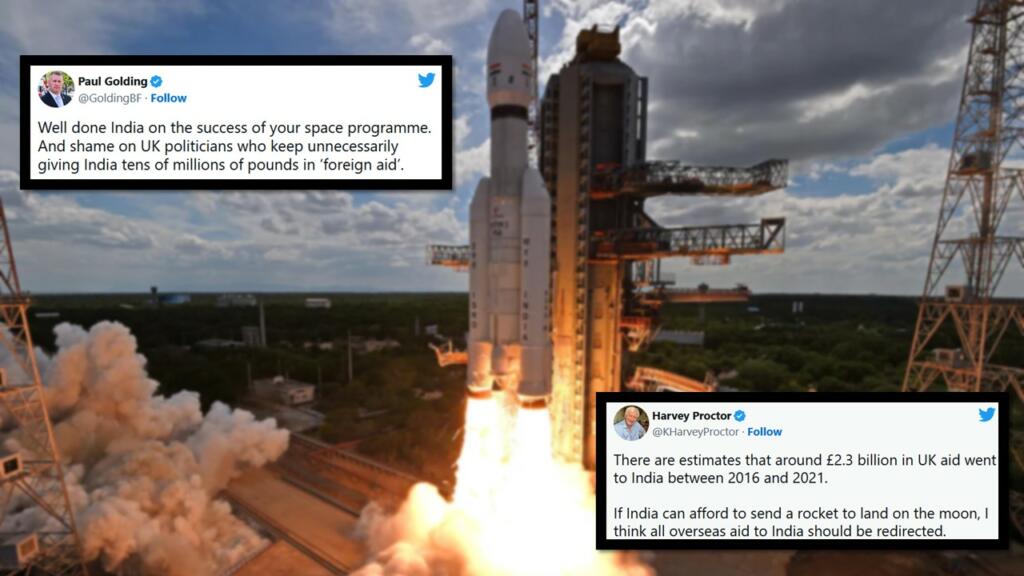India’s successful launch of Chandrayaan-3, aimed at demonstrating soft-landing capabilities on the lunar surface, has sparked jealousy and uncalled sermons from the United Kingdom.
Let’s embark on a cosmic comedy journey, where British politicians and their assumptions collide with Indian wit and space prowess.
launch of Chandrayaan-3: A Damp Island’s Moon Envy
The UK, known for its British weather as its tasteless British food, found itself green with envy as India embarked on its lunar mission. Ironically, the UK, having never sent a spacecraft to the Moon, took it upon itself to lecture India on ethics. Well, well, our erstwhile masters seem to be trying their hand at interstellar diplomacy.
Enter Paul Golding, a British politician and leader of the British First political party. He couldn’t resist tweeting his disapproval, masking it as concern about “foreign aid” from the UK to India. Oh, Paul, jealous much? Shouldn’t you focus on your own economy rather than commenting on India’s stellar achievements?
Well done India on the success of your space programme.
And shame on UK politicians who keep unnecessarily giving India tens of millions of pounds in ‘foreign aid’. pic.twitter.com/1IlgghCsqi— Paul Golding (@GoldingBF) July 14, 2023
Also read: Trading and shelter to fugitives cannot go hand in hand: Modi govt.’s stern message to UK
British Supremacy Delusions
Paul Golding was not alone in his envy-fueled rants. Many British supremacists, still living in the assumption of India being a third world country, found their misplaced superiority complex threatened. Dear Brits, it’s time to let go of your colonial hangover and embrace the fact that India is marching ahead in space exploration.
There are estimates that around £2.3 billion in UK aid went to India between 2016 and 2021.
If India can afford to send a rocket to land on the moon, I think all overseas aid to India should be redirected. pic.twitter.com/7PrNYzEGHc
— Harvey Proctor (@KHarveyProctor) July 14, 2023
Indian netizens, ever ready with their witty comebacks, wasted no time in responding to the condescending tweet. They reminded the British politician of Britain’s historical plundering of Indian wealth, looting trillions of dollars and causing immense suffering. Ouch! That must have stung.
Never ever mess with Indians on this app.
You'll regret learning the alphabet.
(These are the least offensive ones btw) pic.twitter.com/t1HHIrzK0n
— Yew's Finest (@FinestYew) July 15, 2023
Aid, Schmaid! The discussion inevitably turned to the topic of “foreign aid.” Indians pointed out that their country no longer accepts aid from the UK, as India funds its own space program and has its own foreign aid budget. It seems the UK’s “aid” is not quite as essential as they would like to believe.
Indian Self-Reliance
India has always stood proud in its ability to handle crises on its own. When faced with natural disasters or challenges, like the devastating floods in Kerala, India refused external aid, including a generous offer from the UAE. The message is clear: India can manage its own affairs, thank you very much.
While India may have once accepted foreign aid, it has since changed its approach. Rather than relying on external assistance, the country has shifted to different terms for receiving aid. This decision has ruffled feathers among UK parliamentarians, who seem perplexed by India’s self-sufficiency.
No more a global pushover
India’s space program, spearheaded by the Indian Space Research Organisation (ISRO), has made significant strides over the years. From launching satellites to successful missions to the Moon and Mars, India’s contributions to space exploration are commendable. The nation’s scientists and engineers have demonstrated innovation, resourcefulness, and determination in their pursuit of celestial exploration.
India’s achievements have garnered international recognition and respect. Despite facing challenges during the Chandrayaan-2 mission, the country’s resolve to learn from setbacks and persist in its pursuit of lunar exploration is admirable. The successful launch of Chandrayaan-3 places India in an elite league, joining the ranks of the United States, Russia, and China as nations capable of soft-landing on the Moon.
A Tale of Two Mindsets
The cosmic comedy between the UK and India serves as a microcosm of two different mindsets. While the UK clings to a sense of superiority rooted in the past, India embraces a vision of progress and self-reliance. The ability to laugh at the irony and respond with wit is a testament to India’s resilience and confidence on the world stage.
Also read: Abduls cannot hide behind Shiv Dhabas anymore as Yogi govt. takes action
As India sets its sights on conquering new frontiers, the UK’s lunar envy and misplaced lectures only add an amusing twist to the cosmic comedy. India’s unwavering determination, self-reliance, and witty comebacks in the face of jealous commentary make for a stellar performance. So, dear UK, sit back, enjoy the show, and maybe consider sending your own spacecraft to the Moon before offering unsolicited advice to the stars. As India continues to reach for the skies, the cosmic comedy unfolds, reminding us all of the power of ambition, resilience, and the ability to find humor in the vast expanse of the universe.
Support TFI:
Support us to strengthen the ‘Right’ ideology of cultural nationalism by purchasing the best quality garments from TFI-STORE.COM
